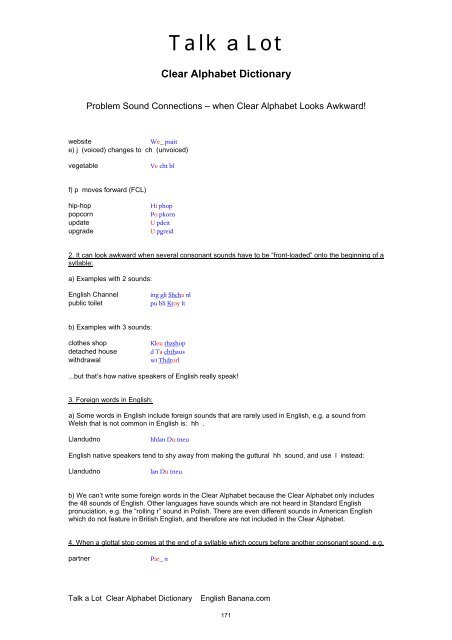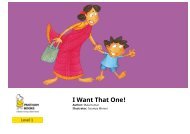- Page 1 and 2:
englishbanana.com’s Kliy Ral f be
- Page 3 and 4:
English Banana.com info@englishbana
- Page 5 and 6:
Talk a Lot Clear Alphabet Dictionar
- Page 7 and 8:
Talk a Lot Clear Alphabet Dictionar
- Page 9 and 10:
Talk a Lot Clear Alphabet Dictionar
- Page 11 and 12:
Lern th Kliy Ral f bet Learn the Cl
- Page 13 and 14:
Talk a Lot Clear Alphabet Dictionar
- Page 15 and 16:
Talk a Lot Clear Alphabet Dictionar
- Page 17 and 18:
Talk a Lot Clear Alphabet Dictionar
- Page 19 and 20:
Talk a Lot Clear Alphabet Dictionar
- Page 21 and 22:
Talk a Lot Clear Alphabet Dictionar
- Page 23 and 24:
Talk a Lot Clear Alphabet Dictionar
- Page 25 and 26:
Talk a Lot Learn the Clear Alphabet
- Page 27 and 28:
Talk a Lot Learn the Clear Alphabet
- Page 29 and 30:
Talk a Lot Learn the Clear Alphabet
- Page 31 and 32:
Talk a Lot Learn the Clear Alphabet
- Page 33 and 34:
Talk a Lot Learn the Clear Alphabet
- Page 35 and 36:
Talk a Lot Learn the Clear Alphabet
- Page 37 and 38:
Talk a Lot Clear Alphabet Dictionar
- Page 39 and 40:
Talk a Lot Clear Alphabet Dictionar
- Page 41 and 42:
Kliy Ral f be_ Di kshn rii Clear Al
- Page 43 and 44:
Talk a Lot Clear Alphabet Dictionar
- Page 45 and 46:
Talk a Lot Clear Alphabet Dictionar
- Page 47 and 48:
Talk a Lot Clear Alphabet Dictionar
- Page 49 and 50:
Talk a Lot Clear Alphabet Dictionar
- Page 51 and 52:
Talk a Lot Clear Alphabet Dictionar
- Page 53 and 54:
Talk a Lot Clear Alphabet Dictionar
- Page 55 and 56:
Talk a Lot Clear Alphabet Dictionar
- Page 57 and 58:
Talk a Lot Clear Alphabet Dictionar
- Page 59 and 60:
Talk a Lot Clear Alphabet Dictionar
- Page 61 and 62:
Talk a Lot Clear Alphabet Dictionar
- Page 63 and 64:
Talk a Lot Clear Alphabet Dictionar
- Page 65 and 66:
Talk a Lot Clear Alphabet Dictionar
- Page 67 and 68:
Talk a Lot Clear Alphabet Dictionar
- Page 69 and 70:
Talk a Lot Clear Alphabet Dictionar
- Page 71 and 72:
Talk a Lot Clear Alphabet Dictionar
- Page 73 and 74:
Talk a Lot Clear Alphabet Dictionar
- Page 75 and 76:
Talk a Lot Clear Alphabet Dictionar
- Page 77 and 78:
Talk a Lot Clear Alphabet Dictionar
- Page 79 and 80:
Talk a Lot Clear Alphabet Dictionar
- Page 81 and 82:
Talk a Lot Clear Alphabet Dictionar
- Page 83 and 84:
Talk a Lot Clear Alphabet Dictionar
- Page 85 and 86:
Talk a Lot Clear Alphabet Dictionar
- Page 87 and 88:
Talk a Lot Clear Alphabet Dictionar
- Page 89 and 90:
Talk a Lot Clear Alphabet Dictionar
- Page 91 and 92:
Talk a Lot Clear Alphabet Dictionar
- Page 93 and 94:
Talk a Lot Clear Alphabet Dictionar
- Page 95 and 96:
Talk a Lot Clear Alphabet Dictionar
- Page 97 and 98:
Talk a Lot Clear Alphabet Dictionar
- Page 99 and 100:
Talk a Lot Clear Alphabet Dictionar
- Page 101 and 102:
Talk a Lot Clear Alphabet Dictionar
- Page 103 and 104:
Talk a Lot Clear Alphabet Dictionar
- Page 105 and 106:
Talk a Lot Clear Alphabet Dictionar
- Page 107 and 108:
Talk a Lot Clear Alphabet Dictionar
- Page 109 and 110:
Talk a Lot Clear Alphabet Dictionar
- Page 111 and 112:
Talk a Lot Clear Alphabet Dictionar
- Page 113 and 114:
Talk a Lot Clear Alphabet Dictionar
- Page 115 and 116: Talk a Lot Clear Alphabet Dictionar
- Page 117 and 118: Talk a Lot Clear Alphabet Dictionar
- Page 119 and 120: Talk a Lot Clear Alphabet Dictionar
- Page 121 and 122: Talk a Lot Clear Alphabet Dictionar
- Page 123 and 124: Talk a Lot Clear Alphabet Dictionar
- Page 125 and 126: Talk a Lot Clear Alphabet Dictionar
- Page 127 and 128: Talk a Lot Clear Alphabet Dictionar
- Page 129 and 130: Talk a Lot Clear Alphabet Dictionar
- Page 131 and 132: Talk a Lot Clear Alphabet Dictionar
- Page 133 and 134: Talk a Lot Clear Alphabet Dictionar
- Page 135 and 136: Talk a Lot Clear Alphabet Dictionar
- Page 137 and 138: Talk a Lot Clear Alphabet Dictionar
- Page 139 and 140: Talk a Lot Clear Alphabet Dictionar
- Page 141 and 142: Talk a Lot Clear Alphabet Dictionar
- Page 143 and 144: Talk a Lot Clear Alphabet Dictionar
- Page 145 and 146: Talk a Lot Clear Alphabet Dictionar
- Page 147 and 148: Talk a Lot Clear Alphabet Dictionar
- Page 149 and 150: Talk a Lot Clear Alphabet Dictionar
- Page 151 and 152: Talk a Lot Clear Alphabet Dictionar
- Page 153 and 154: Spe shl To pikz Special Topics 158
- Page 155 and 156: Talk a Lot Clear Alphabet Dictionar
- Page 157 and 158: Talk a Lot Clear Alphabet Dictionar
- Page 159 and 160: Talk a Lot Clear Alphabet Dictionar
- Page 161 and 162: Talk a Lot Clear Alphabet Dictionar
- Page 163 and 164: Talk a Lot Clear Alphabet Dictionar
- Page 165: Talk a Lot Clear Alphabet Dictionar
- Page 169 and 170: Talk a Lot Clear Alphabet Dictionar
- Page 171 and 172: Talk a Lot Clear Alphabet Dictionar
- Page 173 and 174: Talk a Lot Clear Alphabet Dictionar
- Page 175 and 176: Talk a Lot Clear Alphabet Dictionar
- Page 177 and 178: Talk a Lot Clear Alphabet Dictionar
- Page 179 and 180: Re l vn_ m Tiy riyl frm Tor k Lo_ f
- Page 181 and 182: Talk a Lot Foundation Course 100 Ba
- Page 183 and 184: Talk a Lot Foundation Course Role P
- Page 185 and 186: Talk a Lot Foundation Course Practi
- Page 187 and 188: Talk a Lot Foundation Course Practi
- Page 189 and 190: Talk a Lot Foundation Course Practi
- Page 191 and 192: Talk a Lot Transport Discussion Wor
- Page 193 and 194: Talk a Lot Transport Discussion Wor
- Page 195: Talk a Lot Foundation Course Instru
- Page 199 and 200: Re l vn_ m Tiy riyl frm Tor k Lo_ e
- Page 201 and 202: Talk a Lot Learn the Clear Alphabet
- Page 203 and 204: Talk a Lot Learn the Clear Alphabet
- Page 205 and 206: Talk a Lot Learn the Clear Alphabet
- Page 207 and 208: Talk a Lot Learn the Clear Alphabet
- Page 209 and 210: Talk a Lot Learn the Clear Alphabet
- Page 211 and 212: Talk a Lot Learn the Clear Alphabet
- Page 213 and 214: Talk a Lot Learn the Clear Alphabet
- Page 215 and 216: Talk a Lot Learn the Clear Alphabet
- Page 217 and 218:
Talk a Lot Learn the Clear Alphabet
- Page 219 and 220:
Talk a Lot Learn the Clear Alphabet
- Page 221 and 222:
Talk a Lot Learn the Clear Alphabet
- Page 223 and 224:
Talk a Lot Focus on Connected Speec
- Page 225 and 226:
Talk a Lot Focus on Connected Speec
- Page 227 and 228:
Talk a Lot Focus on Connected Speec
- Page 229 and 230:
Notes _____________________________
- Page 231:
Let’s learn the Clear Alphabet so



